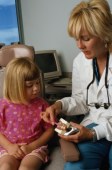- Could Your Grocery Store Meat Be Causing Recurring UTIs?
- Are You Making This Expensive Thermostat Error This Winter?
- Recognizing the Signs of Hypothyroidism
- 10 Strategies to Overcome Insomnia
- Could Artificial Sweeteners Be Aging the Brain Faster?
- Techniques for Soothing Your Nervous System
- Does the Water in Your House Smell Funny? Here’s Why
- Can a Daily Dose of Apple Cider Vinegar Actually Aid Weight Loss?
- 6 Health Beverages That Can Actually Spike Your Blood Sugar
- Treatment Options for Social Anxiety Disorder
Many U.S. Kids Missing Out on Preventive Care, CDC Says


Most adults can remember the battery of health services they endured as kids: hearing and vision tests, dental exams, regular checkups and vaccinations.
Many American kids growing up now won’t have those memories, because millions of infants and children aren’t receiving recommended medical care aimed at detecting and preventing disease, according to a new report from the U.S. Centers for Disease Control and Prevention.
Preventive services that kids and teens are missing out on range from basic medical care to vaccinations and screenings that can have a lifelong impact on their health.
The appraisal, published in the Sept. 12 issue of CDC’s Morbidity and Mortality Weekly Report, also revealed large disparities between groups when it comes to receiving preventive services.
For example, uninsured children are less likely than insured kids to receive these services, and Hispanic children were less likely than non-Hispanics to have reported vision screening.
“We must protect the health of all children and ensure that they receive recommended screenings and services,” Dr. Stuart Shapira, associate director for science in CDC’s National Center on Birth Defects and Developmental Disabilities, said in a CDC news release. “Increased use of clinical preventive services could improve the health of infants, children and teens and promote healthy lifestyles that will enable them to achieve their full potential.”
Specifically, the CDC found that:
- Parents of eight out of 10 young children had not been asked by their doctor to fill out a formal screening questionnaire to detect developmental delays.
- More than half of children and teens had not visited a dentist in the past year, and nearly nine out of 10 had not received a dental sealant or fluoride treatment.
- About half of infants who failed their initial hearing screening did not receive the follow-up testing needed to diagnose potential hearing loss.
- Two-thirds of children between 1 and 2 years were not screened for lead poisoning.
- One in five children had not had a vision exam by age 5.
- One-quarter of doctor visits by children younger than 18 didn’t include a blood pressure check.
- Four out of five teenage smokers got no help quitting, either through counseling or a cessation program.
- Nearly half of teenage girls had not received their first recommended dose of human papillomavirus (HPV) vaccine, which prevents cervical cancer.
While these statistics are gloomy, doctors hope that the new Affordable Care Act (ACA) will turn things around by requiring insurance companies to cover preventive care services for children, often without any cost to parents.
“Now with the ACA, we will be able to provide better care,” said Dr. Jill Maura Rabin, co-chief of ambulatory care and women’s health programs at North Shore-LIJ Health System in New Hyde Park, N.Y. “We’ve seen an uptick in our patient population because of people changing insurance.”
However, it’s still incumbent on parents to get their kids to the doctor for these services, Rabin added.
“An ounce of prevention is absolutely worth a pound of cure, and there’s no longer the excuse that people have to wait until they show symptoms to get treatment because their insurance won’t cover preventive services,” she said.
More information
For more on preventive care for children, visit the U.S. Department of Health and Human Services.
Source: HealthDay
Copyright © 2026 HealthDay. All rights reserved.










